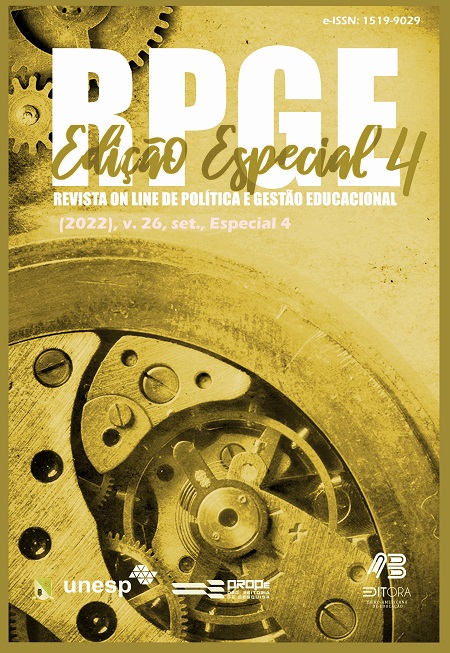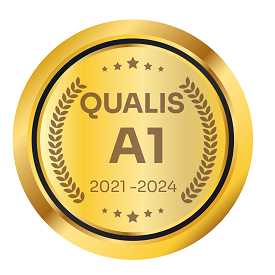La enseñanza de las artes en el currículo de la educación básica en el contexto actual
Contradicciones y desafíos
DOI:
https://doi.org/10.22633/rpge.v26iesp.4.17132Palabras clave:
Educación básica, Enseñanza de las artes, BNCCResumen
En el presente artículo, abordamos la Educación Artística en la Educación Básica en Brasil, desde dos puntos de vista: la formación del educador y la comprensión del arte utilizada en los documentos oficiales, y, luego, defendemos una formación en el campo de las artes de los maestros de educación básica, indispensables para la labor docente y la formación integral de niños, niñas y adolescentes. Apoyados en pensadores críticos, discutimos la Base Común Curricular Nacional (BNCC), en cuanto a la dimensión sensible y el discurso de competencias allí expresado, y defendemos una educación en la que la estética sea el fundamento de la formación docente. Cuando analizamos la BNCC, es bastante notoria la falta de valorización y de lugar en el campo del conocimiento de las Artes. Es casi increíble que en la tercera década de este milenio tengamos que afirmar la enseñanza de las artes y sus repercusiones en la escuela, y sus incuestionables aportes al desarrollo humano. Resaltamos así la formatividad del Arte y el deber del Estado de garantizar el derecho a aprender las Artes en la escuela, asegurando una formación integral al alumno.
Descargas
Citas
ARROYO, M. G. Da escola carente à escola possível. São Paulo: Loyola, 1997.
ARROYO, M. G. Currículo, território em disputa. Petrópolis, RJ: Vozes, 2013.
BRASIL. Resolução CNE/CP n. 1, de 15 de maio de 2006. Institui Diretrizes Curriculares Nacionais para o Curso de Graduação em Pedagogia, licenciatura. Brasília, DF: Presidência do Conselho Nacional de Educação, 2006. Disponível em: http://portal.mec.gov.br/cne/arquivos/pdf/rcp01_06.pdf. Acesso em: 12 jan. 2021.
ECO, U. A Definição da Arte. Rio de Janeiro: Record, 1991.
GROSFOGUEL, R. Para descolonizar os estudos de economia política e os estudos pós-coloniais: Transmodernidade, pensamento de fronteira e colonialidade global. Revista Crítica de Ciências Sociais, v. 80, p. 115-147, mar. 2008. Disponível em: https://journals.openedition.org/rccs/697. Acesso em: 13 abr. 2021.
HOOKS, B. Ensinando pensamento crítico: Sabedoria prática. Tradução: Bhuvi Libanto. São Paulo: Elefante, 2020.
MENDES, J. E.; MEDEIROS, E. A. La escuela en el neoliberalismo y su lucha política para (re)existir y resignificarse. Revista Paradigma, v. 42, n. 3, p. 1-19, set. 2021. Disponível em: http://revistaparadigma.online/ojs/index.php/paradigma/article/view/1119/983. Acesso em: 15 nov. 2021.
ORTIZ, R. Mundialização da Cultura. São Paulo: Brasiliense, 2000.
PAREYSON, L. Os problemas da Estética. São Paulo: Martins Fontes, 1997.
RANCIÈRE, J. O Mestre Ignorante. Belo Horizonte: Autêntica Editora, 2015.
RIBEIRO, D. Os Brasileiros. Livro I – Teoria do Brasil. Petrópolis, RJ: Editora Vozes Ltda, 1983.
RIBEIRO, D. Utopia Brasil. São Paulo: Editora Hedra, 2008.
SACCOMANI, M. C. S. A criatividade na Arte e na educação escolar: Uma contribuição à pedagogia histórico-crítica à luz de George Lukács e Levi Vigotiski. Campinas, SP: Autores Associados, 2016.
SANTOS. M. Por uma outra globalização: Do pensamento único à consciência universal. Rio de Janeiro: Record, 2001.
Publicado
Cómo citar
Número
Sección
Licencia
Derechos de autor 2022 Revista on line de Política e Gestão Educacional

Esta obra está bajo una licencia internacional Creative Commons Atribución-NoComercial-CompartirIgual 4.0.
Manuscritos aceitos e publicados são de propriedade da Revista on line de Política e Gestão Educacional. É vedada a submissão integral ou parcial do manuscrito a qualquer outro periódico. A responsabilidade do conteúdo dos artigos é exclusiva dos autores. É vedada a tradução para outro idioma sem a autorização escrita do Editor ouvida a Comissão Editorial Científica.











